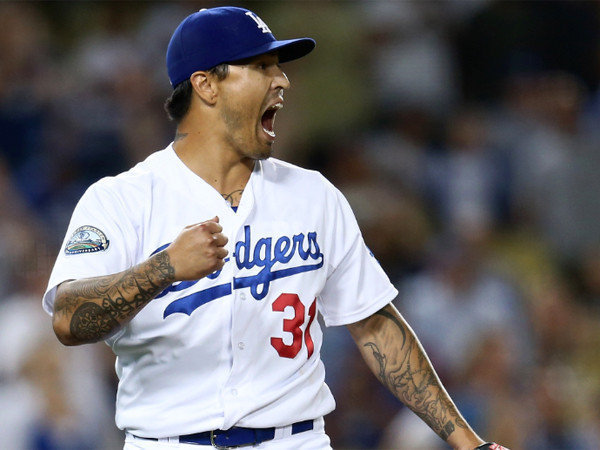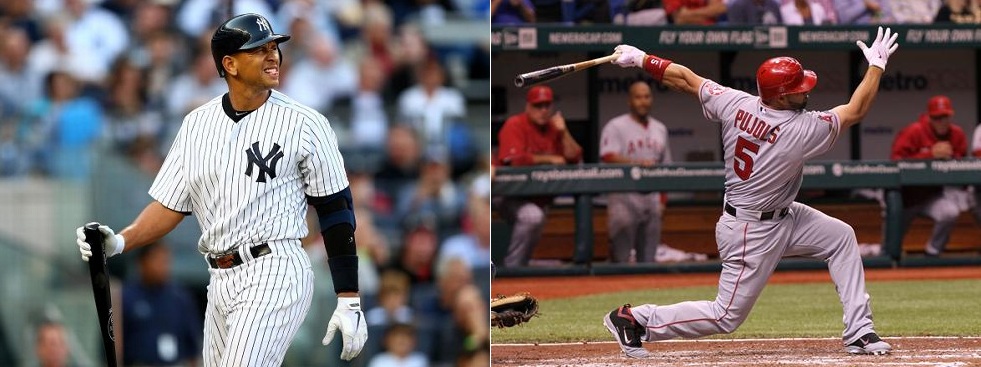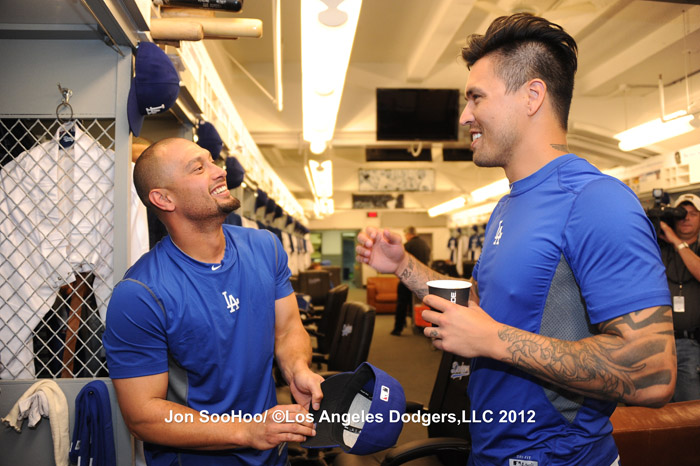One of the most confusing parts of Major League Baseball is free agency; more specifically, the actual rules that govern when it can and cannot occur and what can and cannot be discussed.
The rules governing free agency are covered under Article XX-B of the 2012-2016 MLB Collective Bargaining Agreement (CBA) and let me tell you, reading it is like reading the fine print on a new car contract or one of those internet disclaimers that you scroll through and click “I have read and understand the above” – without doing either.

Pending free agent Brandon League has expressed his desire to remain with the Dodgers and will undoubtedly be one of Ned Colletti’s top priorities this off-season, perhaps as early as next week. (Photo credit – Stephen Dunn)
Rather than reading Article XX-B of the CBA (which is like watching paint dry), I’ll try to sum up the free agency thing for you in a nutshell.
A player officially becomes a free agent at 9:00 A.M. Eastern Time on the day following the last game of the World Series which, barring a miracle, will most likely be 9:00 A.M. Eastern Time on Monday morning.
When a player officially becomes a free agent, the team that he is currently on has until 11:59 P.M. Eastern Time on the fifth day following the last game of the World Series (referred to as the “Quiet Period”) to discuss the possibility of being re-signed by that team. No other teams are permitted to contact a pending free agent during the Quiet Period. As strange (and dumb) as it may sound, the player and the team “…shall not negotiate terms or contract with each other.” They may, however, discuss:
- the Player’s interest in playing for the Club, and the Club’s interest in having the Player play for it;
- the Club’s plans about how it intends to utilize the Player’s services (as a starting pitcher or reliever, as a designated hitter or not, platooning, etc.);
- the advantages and disadvantages of playing for the Club including the nature of the organization, the climate of the city, availability of suitable housing, etc.;
- length of contract;
- guarantee provisions;
- and no-trade or limited no-trade provisions
If these things are acceptable to both the Player and the Club, they can then negotiate the terms (money) of the contract and actually sign a contract at the conclusion of the Quiet Period. If these things are not acceptable to both the Player and the Club or the Club has made no attempt to contact the Player during the Quiet Period (and after 11:59 P.M. Eastern Time of the fifth day following the last game of the World Series), the Player can then be approached (or can themselves approach) any other Clubs in an attempt to negotiate a contract.
Although some players re-sign with their former team, most of them do not, opting instead to test the free agent market with hopes of getting several interested Clubs to bid against one another (in terms of money and/or years) to increase their value. The Player’s agent will also try to increase their client’s value by embellishing on their future potential or comparing their client with other similar high-dollar free agents. This doesn’t always work, however, and occasionally it backfires completely, leading to contracts that are well below what they had hoped for or lower than offers that they turned down earlier in the off-season. On the other hand, team owners who conspire against free agents in an attempt to keep them out of the game are guilty of collusion, for which there are very serious penalties and sanctions.
To date, the single-highest free agent contract ever signed in MLB history is, of course, that of Yankees third baseman Alex Rodriguez who, on December 13, 2007, signed a 10-year contract worth $275 million. Next is the 10-year $240 million contract signed last off-season by Albert Pujols with the Angels. Contracts such as these (and Prince Fielder’s 9-year/$214 million contract also signed last off-season) could only happen in the American League where these guys could possibly be used as Designated Hitters late in these insanely long contracts (A-Rod will be 43, Pujols 41 and Fielder 38 when their contracts expire).

How productive will A-Rod and Pujols be in the final year of their contracts when they are 43 and 41 years old respectively? (Photo credit – Elsa Garrison & Kim Klement)
The Dodgers have ten players eligible for free agency. They are:
- Bobby Abreu
- Joe Blanton
- Randy Choate
- Todd Coffey
- Adam Kennedy
- Brandon League
- Juan Rivera
- Matt Treanor
- Shane Victorino
- Jamey Wright
Of these ten, I believe that the Dodgers will attempt to re-sign Choate, League, Wright, and perhaps Rivera (but only because of the uncertainty of Kemp and Crawford being ready on Opening Day). That said, Colletti has already indicated that Jerry Hairston Jr. will most likely be the teams 4th outfielder, so Rivera may not be re-signed.

While it’s a safe bet that Brandon League will be a Dodger in 2013, Shane Victorino probably will not. Victorino will most likely be seeking a 5+ year contract, something that the Dodgers are unlikely to do. (Photo credit Jon SooHoo)
There are a number of other important factors in Article XX-B of the CBA, such as draft compensation picks based on the Player’s status as either a Type-A or Type-B free agent, but this should give you an understanding of how the basic free agency process works. And it all starts at 11:59 P.M. Eastern Time on Friday night when the 2013 Hot Stove will officially be lit – unless the Tigers some how manage to prolong the inevitable, that is.




 October 28th, 2012 at 8:27 am
October 28th, 2012 at 8:27 am  by Ron Cervenka
by Ron Cervenka  Posted in
Posted in 

I hope they keep League. Obviously, I like Victorino, but I fear he’s gone. I like Wright, but who knows how much gas is left in his tank? Choate’s a big question mark, and the others are expendable in my judgement. The big question is who will take the departed ones’ places on the roster. I vote for kids from the system, not more retreads unless the veterans still have an upside!
The only players, that I fell that the Dodgers should keep are: Brandon League, Randy Choate, Matt Treanor and Jaun Rivera. As far as the rest of the players on that list go, there either no room for them. Or they just plain flat out suck.
+1 Curt
It’s always interesting who they keep and sometimes very surprising. The FAs that they sign off the market are usually players we hardly expected and even though it looks like we have most of our position players I don’t think this year will be any different.